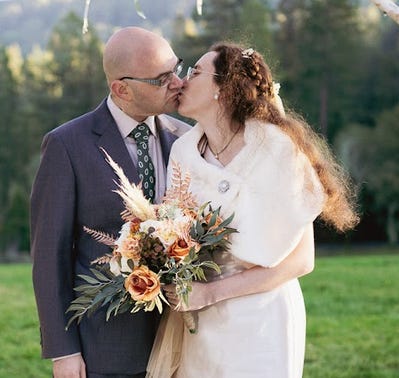There's A Time For Everyone
Last week I got married.
I met her two years ago, at one of (our mutual friend) Aella’s weird parties.
 Not this one, a different one. I was at this one too though. It was great.
Not this one, a different one. I was at this one too though. It was great.
Our first date, we talked about Singapore’s child tax credits, which gave me advanced notice of where her mind was at. Our second date, we talked about category formation in borderline personality disorder, which later became this post. Our third date, we talked about why Inuit suicide rates were so high, which later became this post.
Then COVID hit. We switched our dates to a Minecraft virtual world, where we built a house together. At the time, I completely missed the kabbalistic significance of this.
I don’t usually talk about my personal life on here. But I feel like I owe you guys this one, because, well, some of you have been reading this blog a long time. And some of my earliest posts (eg) were me complaining about the dating world, and how tough it was to meet anybody or even to stay sane. And you guys were kind to me, and commiserated with me, and shared your own experiences. I feel an obligation to check in with the rest of you, to celebrate those of you who have also succeeded and empathize with those of you who haven’t yet.
Maybe I’m not a success story here, exactly. I’m getting married at 37, a lot later than I would have liked. And my story involved parts that probably don’t replicate well, like becoming a niche Internet microcelebrity whose readers sometimes invite him to things despite his many social inadequacies.
But everyone’s story is weird. During college, my father moonlighted as a juggling instructor. My mother signed up for his class, one thing led to another, and a year later they ran off to Sardinia together and got married. My best man met his wife when she dropped out of philosophy grad school to join the transhumanist compound he was staying at. Darwin spends five billion years optimizing your genes for reproduction, and God laughs and decides that whether or not you mate will depend on which weird parties you go to, or whatever.
My point is, I’m no longer a total failure at this. So as I make the sudden transition from advice-consumer to advice-dispenser, my recommendation for those of you in the same place I was ten years ago is: accrue micromarriages.
Micromarriages come from this post by Chris Olah. They’re a riff on micromorts, a one-in-a-million chance of dying. Risk analysts use micromorts to compare how dangerous different things are: scuba diving is 5 micromorts per dive; COVID is 2,500 micromorts per infection; climbing Mt. Everest is 30,000 micromorts per attempt. So by analogy, micromarriages are a one in a million chance of getting married. Maybe going to a party gets you 500 micromarriages, and signing up for a really good dating site gives you 10,000. If there’s a Mt. Everest equivalent, I don’t know about it.
Chris thinks of micromarriages as a motivational tool. If you go to a party, and you don’t meet anyone interesting there, it’s tempting to get discouraged. If you try again and again, with identical results, it’s tempting to give up. Chris says: instead, think of yourself as getting 500 micromarriages each time (or whatever you decide the real number is, with the understanding that you should update your estimate at some rate conditional on success or failure). All you need to do is go to a thousand parties and you have a 50-50 chance of meeting the right person! Maybe that number would sound more encouraging if it was lower - but it took me twenty years of trying, so I couldn’t have been getting more than a few hundred micromarriages a day, and I wasn’t slacking off.
(by the way, Chris is still looking for a partner - if you’re interested in the kind of person who would come up with this idea, check the gray box at the bottom of his post. Hopefully I can send at least a few micromarriages his way!)
Twenty years and exactly one million micromarriages later, I have yet to find any better advice. Gather your micromarriages while ye may, for time is still a-flying. Do annoying things, expect them to fail, and increment a little counter in your head each time, to prevent yourself from going insane. Then do more annoying things. Teach a juggling class. Join a weird transhumanist compound. Go to one of Aella’s weird parties. There is no royal road. I’m not claiming to have super useful advice here, just to be able to say from the end of a long and very rocky path that it does eventually pay off. Or as Lin Manuel-Miranda put it:
I may not live to see our glory
But I’ve seen wonders great and small
If Alexander can get married
There’s hope for our ass, after all!
II.
The wedding was very nice. Maybe a bit generic: so far there’s no standardized Rationalist liturgy. A friend read the poem G.K. Chesterton wrote about his own wedding, which ends:
Never again with cloudy talk
Shall life be tricked or faith undone,
The world is many and is mad,
But we are sane and we are one.
My main contribution was begging the officiant to skip one part of the secular wedding ceremony: the lecture on The Meaning Of Marriage In This Modern World. I envy religious people. I assume they get to just say “We’re getting married because God commands it, any objections, no, good, let’s eat cake.” But secular weddings, by tradition, have to navel-gaze about whether traditions are still relevant, then come to the predetermined conclusion that it’s a tough question but in some sense they definitely are, and only then eat cake. One of the many things religious people do better than us.
Besides, I think the standard answer here is mostly right. Marriage is a contract, no different in theory than an airline’s contract with an airplane manufacturer. The airline says they’ll buy X planes over the next ten years; the manufacturer says they’ll provide them at such-and-such a price. At the moment of signing, both parties think it’s a good idea. If they both knew it would stay a good idea, a contract would be unnecessary. But something might change. The air travel market might crash, and then the airline would regret having ordered more planes, and want to back out. The price of raw materials might go up, and then the manufacturer would regret offering such a low price, and want to back out themselves. But it would be unfair for the airline to make the airline manufacturer commit to a complicated course of action - building new factories, hiring lots of workers - and then change their mind, leaving them in a worse position than when they started. And it would be unfair for the manufacturer to make the airline commit to a complicated course of action - opening new routes, signing contracts with more airports - and then pull the rug out from under them and demand a higher price. So if you’re committing to a mutual enterprise where both sides are going to make big irreversible changes to satisfy the other, you want a contract where they both agree not to back out, and agree to suffer heavy social and financial sanctions if they do.
(Eliezer Yudkowsky sometimes describes this as ‘changing yourself into a more coherent person in order to become a better bargaining partner’, which I find strangely romantic.)
This is the title image of Robin Hanson’s Overcoming Bias , a blog my bride and I both read. The Greek hero Odysseus is sailing through Siren-infested waters. He knows that the Sirens have hypnotic powers, and that anyone who hears their song will stop thinking straight and probably steer their boat into a rock or something. So before the Sirens appear, he ties himself to the mast, so that the future version of himself who hears the Siren song can’t screw anything up. Hanson uses it as a general symbol of thoughtful precommitment, of taking steps to constrain future selves who might have values unaligned with yours. Marriage - and any other contract - is a deliberate effort to constrain your future actions so that you can make long-term plans that heavily affect other people - your spouse, but also your future children - without them having to constantly worry about you running off to any Siren you hear.
But that standardized answer is only mostly right. There’s an esoteric interpretation too, something way better.
A long time ago, I wrote a post about bad marriages:
My ex-girlfriend Ozy writes a relationship advice column. Probably taking relationship advice from an ex-girlfriend is some kind of classic mistake, but I read it anyway. They describe five kinds of relationship problems – stupid problems, basic incompatibilities, problems that are actually a different kind of problem, terrible people, and horrifying soul-sucking messes. For some reason, this taxonomy has stuck with me when all the supposedly evidence-based taxonomies I hear the social workers talk about have failed. And the horrifying soul-sucking mess category sticks with me most of all:
“A problem of one of the previous types was badly managed, perhaps for years. Now, every time you have a minor argument, you bring in everything wrong that happened for your entire relationship. You don’t feel like you can trust your partner. All the quirks you used to find charming drive you up the wall. You hate even your partner’s most innocuous actions. You avoid every topic that leads to a fight, and rapidly find that you can’t discuss anything except Marvel movies and the weather. You’re defensive whenever your partner says anything that sounds like even a minor criticism. You’re sarcastic and you call them names. Somehow, when you remember good things about the past– the time you saw Hamilton together or your birthday present or being the best man at their wedding– all you can remember is the long lines at intermission, the poor wrapping job, and their incredibly rude drunk aunt. If asked to name a good trait of theirs, you draw a blank, but you can go on for hours about their flaws.
I guess it might be in theory possible to fix a horrifying soul-sucking mess with a lot of hard work, but to be honest every time I’ve seen a person in one of those relationships they were a lot better and happier and stronger as people as soon as they ended it.”
Later, I drew on this same idea when I was talking about trapped priors:
I’ve heard some people call this “bitch eating cracker syndrome”. The idea is - you’re in an abusive or otherwise terrible relationship. Your partner has given you ample reason to hate them. But now you don’t just hate them when they abuse you. Now even something as seemingly innocent as seeing them eating crackers makes you actively angry. In theory, an interaction with your partner where they just eat crackers and don’t bother you in any way ought to produce some habituation, be a tiny piece of evidence that they’re not always that bad. In reality, it will just make you hate them worse. At this point, your prior on them being bad is so high that every single interaction, regardless of how it goes, will make you hate them more. Your prior that they’re bad has become trapped. And it colors every aspect of your interaction with them, so that even interactions which out-of-context are perfectly innocuous feel nightmarish from the inside.
Once you’ve had enough bad experiences with someone, your prior solidifies until you start interpreting even neutral or good experiences as bad ones, and every time you interact with them you just get angrier and angrier until it’s a giant black hole.
For some reason neither Ozy nor I ever wondered about the opposite phenomenon. Is it possible to like someone so much that the positive emotion builds on itself, grows stronger and stronger with every interaction, until it’s one of those blue supergiant stars in the galactic core?
Just to ask the question is to answer it: I’ve seen lots of couples in this position. Not all, maybe not even most. But some family members. Some friends. And after two years of dating my now-wife, I can viscerally sense the possibility. Like a slope I’m just beginning to roll down, gathering speed as I go.
Obviously this is terrifying. Brain knobs and dials aren’t supposed to get turned all the way to 100%; that’s why you stay away from fentanyl. Certainly you take lots of precautions before stepping out on to a slope like that. We’re getting married, and doing a prenup, and we’ve worked out some more complicated edge cases just between the two of us. Will it be enough? I don’t know; I’m not sure anyone can know at this point.
But: everyone says that picture of Odysseus is supposed to represent pragmatism and rationality. It doesn’t. The practical, rational course would be to do what all the other sailors in the picture are doing and wear earplugs. Odysseus is deliberately avoiding this. He’s making everyone else wear earplugs, then tying himself to the mast; he wants to hear the siren song and live. Why? Curiosity, I guess. The lure of some sort of supernatural unearthly beauty - beauty apparently intense enough to die for. This isn’t a picture of doing prudent game theory stuff. This is a picture of being a hopeless romantic, and then hastily doing some prudent game theory stuff afterwards so you don’t literally die.
This is how I feel about getting married. We are definitely doing prudent contract-drafting work. But it’s ropes, not earplugs. Prudence while fully exposed to supernatural unearthly beauty.
The first virtue is curiosity. And I can’t wait to see what our life together will be like.
[I’m on honeymoon this week; expect fewer posts and slower replies to emails]

